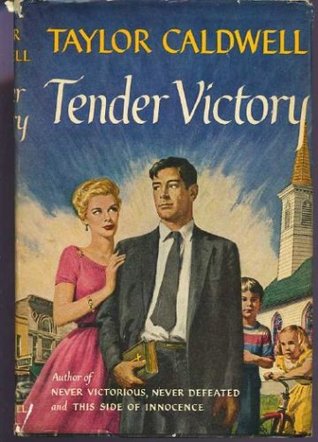First sentence: When matters, events, or people bored or exhausted or troubled Dr. Francis Stevens, he would retire mentally to a pleasant place where he could reflect on the fact that he so closely resembled Francis Cardinal Spellman that it had become an affectionate joke between him and his friend.
Premise/plot: Johnny Fletcher, the hero, is a young military chaplain returning to the States from Europe. He's bringing with him five orphaned children. His friend, Dr. Stevens, has arranged a job for him. He'll be a minister in a small mining town, Barryfield. But adjusting to a "normal" life after the war is tougher than he ever imagined. Both for him and his children. In part because he is determined to raise two of his children as Catholics, two as Protestants, and one Jewish. Fortunately, Barryfield has a Catholic church, a synagogue, and his own Protestant church where he'll be ministering. Unfortunately, Barryfield's residents--except for three or four people--have a mob mentality and are easily upset and ready to explode in outright violence at the drop of a hat. They also are a strong hold of Communists.
My thoughts: Edward Bulwer-Lytton wrote, "The pen is mightier than the sword." The pen--or more likely typewriter--becomes a machine gun in the hands of Taylor Caldwell. Books should never be this poorly written.
Literary issues. The book is not character-driven. It is not
plot-driven. It is not even premise-driven. It is driven by ideas or
anti-ideas. The book is just as much about what it is FOR as what it is
AGAINST. The characters do not exist in their own right but exist merely
for being the voices of various ideological ideas or positions. Which
leads to the problem I have with the dialogue. I feel like the dialogue
is essentially a tool, a hammer. Every single page, the dialogue is
hammering something. Every single time a character opens his or her
mouth, it's to hammer down an idea for the readers. The dialogue doesn't
come across as natural because every word is an opportunity to preach a
message.
Content issues. This book about a minister has a lot of curse words,
which may or may not be offensive to the average reader. (Depending on
the word and how often it is used--that is my standard.) This one has
blasphemy. If the characters weren't supposed to be Christian, if so
much of this one didn't take place in the church or in the church
parsonage, if this was your typical, modern book--I wouldn't be
surprised or taken aback by that.
Theological issues. So the main point of this book seems to be singing
the praises of tolerance. All religions lead to the same God; there are
many roads, many paths, many ways to finding God. No matter what name
you call him, God is God. The content of what you believe doesn't matter
so long as you're sincere. One religion is not "better" than the other.
One is not "more true" or "less true." Even when the religions disagree
with each other unmistakably--they all lead to God in the end, and all
is well. It's best to let people come to their own knowledge and
understand of who God is. He's there to inspire love and kindness here
on earth. If John Lennon's Imagine had been a single, I bet Johnny
Fletcher would have gone around singing it day and night, night day.
The extremes irritated me. It seemed there were only two options of thinking in the novel. If you don't agree with Fletcher on whatever issue has come up, then you are the ENEMY with rocks ready to throw, knives ready to stab, matches ready to burn. And there are many issues in this one. For example, the environment, unions, communism, nuclear programs, education, religion, politics, etc.
The low point of this one--and I mention it on purpose--is when the parsonage is BURNED DOWN on Christmas Eve with everyone still inside. It's one thing for the presents to go up in flames and be lost. It's quite another to introduce a new puppy for the children a chapter before and kill off the dog. Oh. His dying from congenital heart problems daughter also dies within a day or two because of the shock and trauma of the fire.
The extremes irritated me. It seemed there were only two options of thinking in the novel. If you don't agree with Fletcher on whatever issue has come up, then you are the ENEMY with rocks ready to throw, knives ready to stab, matches ready to burn. And there are many issues in this one. For example, the environment, unions, communism, nuclear programs, education, religion, politics, etc.
The low point of this one--and I mention it on purpose--is when the parsonage is BURNED DOWN on Christmas Eve with everyone still inside. It's one thing for the presents to go up in flames and be lost. It's quite another to introduce a new puppy for the children a chapter before and kill off the dog. Oh. His dying from congenital heart problems daughter also dies within a day or two because of the shock and trauma of the fire.
There are moments when Fletcher says something I agree with. A
broken clock, a stopped clock, is right at least twice a day.
Quotes:
Quotes:
I can't be minister to people who want their religion comfortable, a kind of dessert at the end of a week's pleasant dinner. You know, I've always been sorry for the Pharisees--they're such cowards. And I can't condone cowardice, and pretend with any congregation that religion's a soothing thing. It isn't. It's a call to the spirit to struggle against the flesh, and against all evil. (50)
© 2018 Becky Laney of Becky's Book Reviews


1 comment:
Whoa, this one sounds a bit much for me 😖 He must have certainly had an axe to grind.
Post a Comment